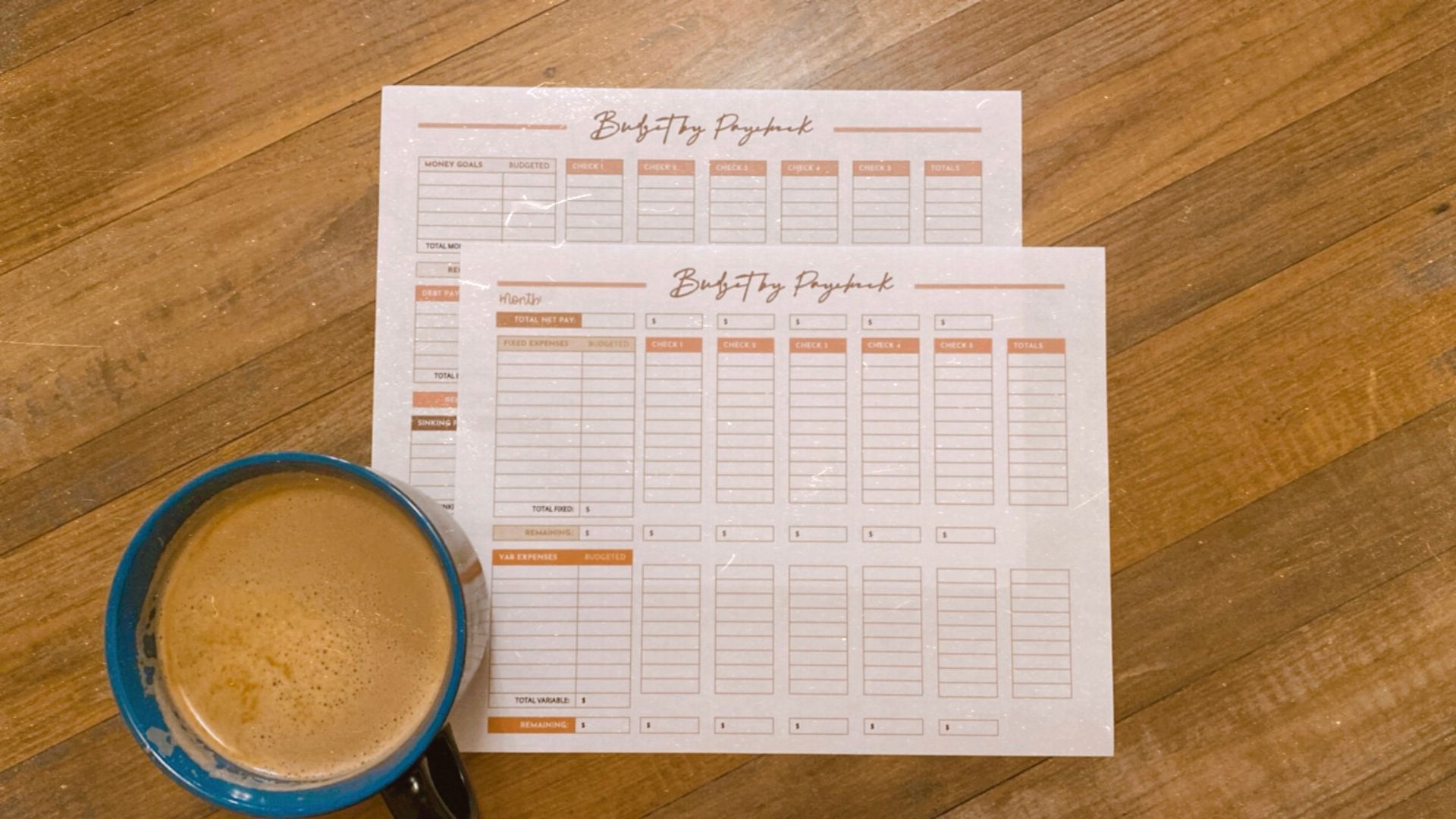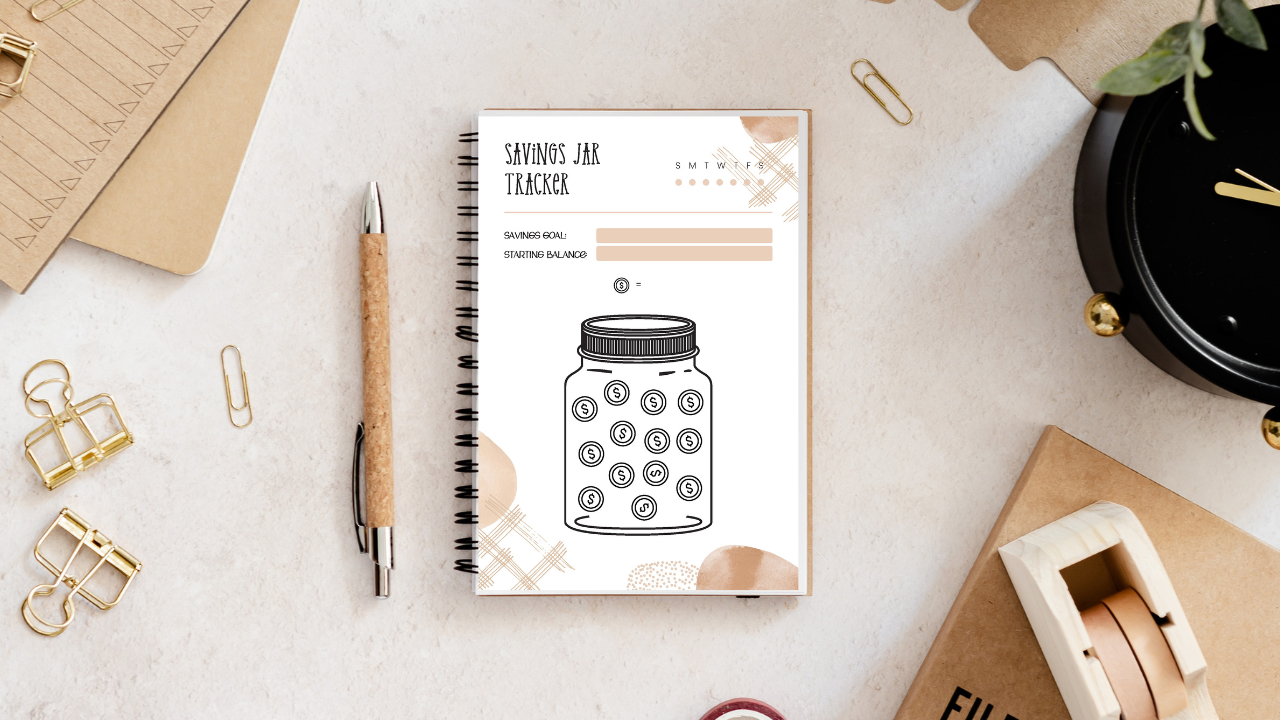
The Ultimate Guide to Using a Budget Notebook Effectively
If you’re looking for a better way organize your personal finances, a budgeting notebook is a great way to keep track of your finances and reach your financial goals.
Financial stability is not determined primarily by how much money you make, but rather by how well you plan.
That being said, we can do everything “right” on paper, but ultimately, the Lord determines our steps. Scripture says many are the plans in a man’s heart, but the Lord’s purposes prevail. We can’t say definitively that if you follow x formula, you’ll get y as a result. The Bible does have many financial principles that indicate if we do certain things, the likelihood of financial success and stability is greater. But we are to steward our finances with the little or the lot that the Lord graciously blesses us with—being content in every circumstance!
One of the ways we can steward our finances is through proper planning and seeking to improve our money management skills. This can be especially hard as a mom--- there are so many plates we are trying to juggle and things we must keep moving --- but it’s nonetheless an essential skill as a wise homemaker.
What is a Budget Notebook?

Also called a budget binder, a budget notebook includes all your key financial planning worksheets and documents in one place:
- Spending
- Monthly bills and due dates
- Subscriptions tracker
- Bullet journal expense tracker
- Savings
- Savings goals and savings trackers
- Savings account balances
- Sinking funds and worksheets
- Debt
- Debt snowball and debt payoff trackers
- Budget planning
- Monthly budget planner
- Weekly budget planner
- Bank account reconciliation
Your budgeting notebook can include as much or as little as you’d like—the list above is not exhaustive. Depending on your personality, you may choose to keep just the essentials, and that’s okay!
Benefits of Keeping a Budget Notebook
Even if you’re not type A, a budget notebook is a great idea because it will reduce financial stress by giving you a clear picture of your financial situation.
It’s important to know where things are with your finances so you can evaluate and plan. Without a clear plan, you’re aimlessly wandering around lacking any control of where your money is going.
In contrast, a knowledge of where things are coupled with a proper plan will help you reach your financial goals faster. If you’re aiming at nothing (you have no financial goals), you’ll hit it every time!
The great news is that you don’t have to be a numbers person to benefit from keeping a budget notebook! Budgeting is for everyone, even if it doesn’t come naturally, and even if you have no idea what you’re doing at first.
I’m here to navigate you through the steps of setting up a budgeting notebook. Even if you feel discouraged as you walk through the steps, stick with me! Your hard work will pay off in the end. It's comforting to know where things are so you can plan for where you want to be! Taking control of your finances isn't rocket science, it just requires a little planning and a lot of diligence.
Create your own Budget Binder / Budget Notebook
Budgeting

The foundation of financial planning is
budgeting.
The monthly budget is what gives a clear picture of where things are really at, and what you can do to get where you want to go.
Why Budget?
Trying to understand, organize, and take control of your financial situation without a budget is like trying to get to your destination without a plan. Your chances of successfully arriving at your destination on time greatly increase when you first map out your route.
Budgeting is an essential part of your financial planning -- whether you’re a numbers person or not—and will give you peace if you just take the time to get it dialed in.
We all need some level of predictability. Absent of a budget, our finances will feel like they’re completely out of our realm of control. To an extent they will be—you’ll have unexpected expenses that come up during the month-- but we can prepare for and predict that we will have unexpected expenses at some point. Thus, the unexpected expenses aren’t really that unexpected; we know they will occur at some point.
Choose a Budgeting Method
Some considerations for budgeting include time period, template style, and the method of planning your expenses.
One thing I've learned that was a game-changer for me is that budgeting doesn't have to be done on a monthly basis. It can be done on a weekly basis, bi-weekly basis, or any other cycle you choose. The key is that it aligns with your personality (whether you're a detail or big-picture person), and your pay schedule(s).
Another consideration is whether to have a written budget or digital planner. If you're just starting out, I recommend actually writing your budget out on paper. Once you get the hang of it, you can switch to an excel budget template or editable pdf template.
Finally, there are different budgeting methods, such as the 50 30 20 budget method and the zero-dollar budget method. Personally, I prefer the zero-dollar budget method because it's specific to your needs, as opposed to the one-size-fits-all nature of the 50 30 20 budget.
Create your Monthly Budget
A monthly budget is easy to create, as long as you're using accurate information. My method for creating a monthly budget is as follows:
- List monthly (take-home) income from all sources.
- Write down all your fixed monthly expenses.
- Calculate all your variable & seasonal/irregular expenses.
- Set financial goals and put in the budget.
- Label each expense as either necessity or discretionary, and adjust as needed.
- Subtract total income from total expenses. Adjust until zero.
- Track your spending!
Assigning every single dollar a purpose, on paper (or an excel spreadsheet) before the month begins will give you peace and bring order to your finances. Not everything will go according to plan- but we plan for that too!
An important note here is that checking your bank account balance is not the same thing as budgeting. If you spend and just keep checking your account balance to make sure it isn't zero, that's not a plan!
Budgeting has been a huge blessing to our family, and one reason we feel financially secure even whilst navigating becoming a one-income family so I can stay home with our children.
Free Budget Template
Download my free budget templates and pick a monthly budget page that works for your specific needs and will keep you focused on your budgeting goals.
If you’re paid weekly, the paycheck budget template is likely the most functional for your needs. If you’re paid monthly, the monthly budget template will work best. This free download has a budget for each style!
Spending
In this section of your budget binder, you might keep:
- monthly bills, amounts and due dates
- non-monthly expenses and due dates
- sinking fund balances
- monthly spending totals
- subscriptions tracker
Failing to keep track of your spending after setting your budget is like mapping out a route for a road trip, plugging it into the GPS, then covering your gas gauge up so you never know how close you are to empty. If everything goes perfectly, you may be able to give it a guess and have no issues. However, any detours or changes in the plan, and you will find yourself frustrated and wishing you could see the gas gauge, because you never really know how much longer you can make it before you need to fill up.
It’s the same with our finances. We can make a fantastic plan (the budget), but if we aren’t tracking what we’re spending, it’s just a guessing game until the next fill up (payday). When living this way, you'll often find that at the end of the month there's more month than money left.
The easiest way to track your spending is through an app, such as EveryDollar, though I recommend manually tracking if the first time.
if you've developed bad spending habits, you might want to try a spending freeze to help you gain control.
Start Tracking
The first step to track your spending is to review your last 3-6 months of bank account statements and break the expenses into different categories.
Expenses that are fixed—meaning they don’t change month to month—are straightforward to budget. Variable expenses—those that change month to month— are budgeted for by using an average.
Next, make your monthly spending plan by writing down your monthly income (take-home), and listing out each expense category and amount and subtracting total expenses from income. If this number is negative, you are spending more than you make. If positive, you are in the green!
Finally, after making the plan it's vital to track your expenses on either a daily or weekly basis. I prefer to track our spending at least every other day to stay on top of it. I use the EveryDollar paid app, which automatically pulls in transactions from our checking account. All I have to do is drag and drop each transaction to the right budget category. This takes max five minutes per day!
Saving

This section of your budget binder could include your savings goals, savings account balances and documents, retirement account statements, and related research or account balances.
Tracking your savings goals will increase the likelihood of reaching them. No matter how big or small the goal, track your progress along the way.
As a rule of thumb, you should always be saving for something. If you wait until your car breaks down and doesn’t run to save for a new one, it’s likely going to be a stressful financial situation. Instead, setting aside a little bit every month long before you need a new vehicle will relieve the stress of the financial situation, making it an inconvenience rather than a crisis.
As much as possible, we are always saving for various future expenses, such as:
- New vehicles
- Medical expenses (via HSA)
- Replenishing/building up emergency fund
- Investing for retirement
- Vehicle repairs & maintenance
- Home repairs & maintenance
- Home building fund (we are in the beginning stages of building)
- Down payment on a home
- New phones
- Christmas gifts/parties
- Special occasions
- Vacations
Depending on the nature of the expense we’re saving for, we keep our savings in either our general savings account or in our high-yield savings account.
Some seasons have allowed us to save more than others. However, even if we can’t cover the full expense when it comes, having a good start is much better than nothing!
Debt

Create a section in your budget binder for your debt payoff goals. Whether you want to pay off your house, car, student loans, or credit cards, keeping visual track of your progress is key to staying focused and motivated towards your short and long-term goals.
Click here to download my free debt tracker bundle and track your debt payoff progress!
Financial Goals
Financial goal setting is a key part of a healthy financial plan. It might be helpful to start by identifying your financial stressors-- keep in mind these will be different for everyone.
Is it the mounting credit card debt? Crippling monthly student loan payments? Do you have any money set aside in an emergency fund?
Once you identify the stressors, you can create goals. If debt is eating your income every month, make a goal to pay off your consumer debt in 12 months. Then print out a debt free coloring page and visual debt payoff tracker, and put it in your budgeting notebook.
Other Financial Documents
Include whatever other financial documents you'd like in your budget binder. If you're into markets and funds, you could keep your financial spread information in your budget binder. This way, if you want to look up how your particular portfolio is performing, you just have to reach for your budget binder to find the necessary information.
Some people like to keep receipts for large purchases, detailed expense calculations, sinking fund balances, etc., in their budget binder.
It's completely up to you how to organize your budget notebook, just make sure it's practical. It is handy to have everything you need for your finances in one spot!

Share this post!






















































































































